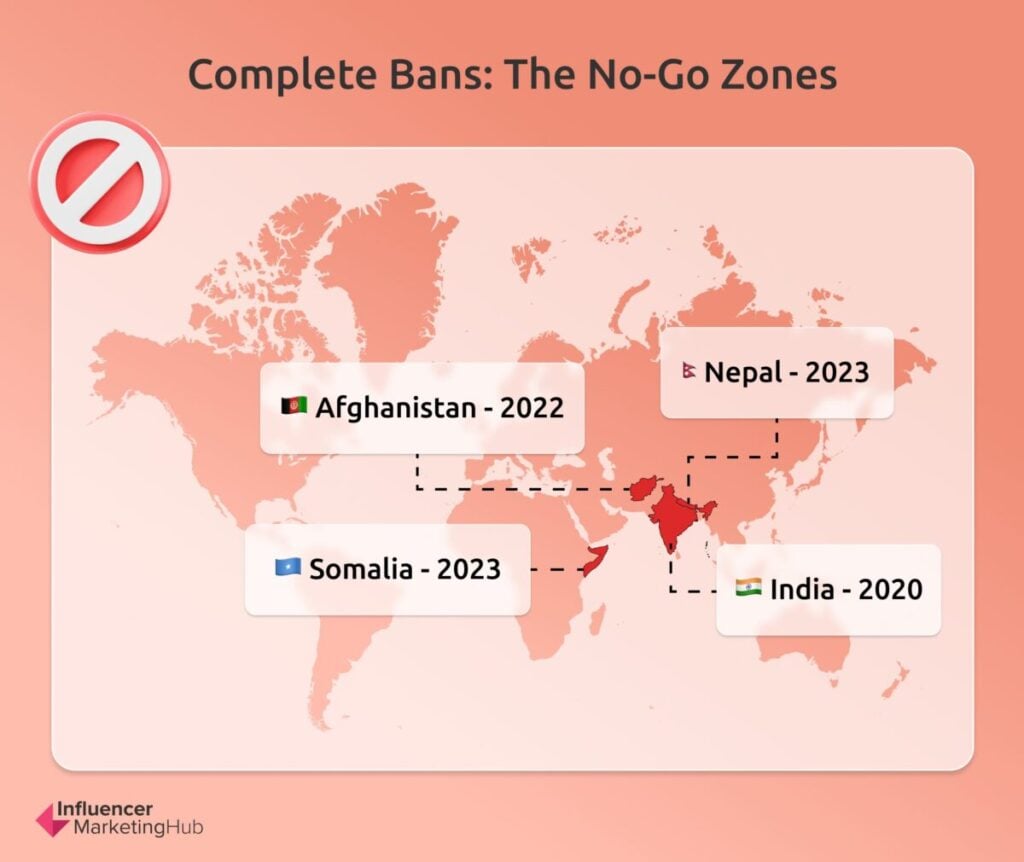The clock is ticking for 1.5 million Albanians who’re about to see their TikTok screens go darkish.
As Albania’s Prime Minister Edi Rama drops the hammer with a year-long ban – citing a spiral of youth violence and cyberbullying – it is simply the newest chapter in TikTok’s more and more sophisticated world story.
ByteDance’s platform which turned dance challenges into cultural phenomena and on a regular basis customers into world stars now faces an existential disaster. Whereas almost 2 billion customers nonetheless swipe by means of their For You web page each day, governments worldwide are hitting pause – or in some instances, delete – on the app that outlined a era.
Full Bans: The No-Go Zones

It began with India pulling the plug on TikTok in June 2020. Amid rising tensions with China, the world’s largest democracy switched off TikTok for lots of of hundreds of thousands of customers in a single day.
Afghanistan adopted swimsuit in 2022, with the Taliban claiming to guard youth from dangerous content material.
Nepal’s story provides one other twist – after banning the app in November 2023 over “social concord” considerations, they reversed course in August 2024, displaying simply how fluid these digital boundaries will be, if somebody desires them to.
In the meantime, Somalia slammed its digital doorways in August 2023, citing considerations over “indecent content material and propaganda”.
Partial and Conditional Restrictions
The plot will get extra fascinating while you have a look at international locations taking a middle-ground strategy:
China, TikTok’s birthplace, maintains strict management over the worldwide model on overseas units. To color the broader strokes: whereas Chinese language customers are directed to its home twin Douyin (抖音), the worldwide TikTok stays locked out of its residence nation.
Kyrgyzstan blocked TikTok entry in August 2023 till the platform implements correct age verification, citing considerations over youth psychological well being.
Jordan’s momentary ban throughout civil unrest confirmed how social media restrictions can be utilized as political instruments
Uzbekistan maintains selective blocking of TikTok, as a part of its broader sample of social media management during times of social unrest.
The Sophisticated Relationship between US and TikTok
The U.S. strategy to TikTok has advanced dramatically from easy authorities machine restrictions to the brink of a potential nationwide ban. Whereas federal businesses and lots of state governments already prohibit TikTok on official units, a new regulation signed by President Biden this spring may power ByteDance to promote TikTok or face an entire U.S. shutdown by January 19, 2025.
The stakes reached new heights on December 18 when the Supreme Courtroom agreed to fast-track TikTok’s problem to the regulation, scheduling a crucial listening to for January 10, 2025. This choice to fast-track the case speaks volumes about its significance – we’re watching a conflict between free speech and nationwide safety play out in actual time.
If ByteDance would not promote by the deadline, TikTok would grow to be unlawful on U.S. app shops and inaccessible on American web browsers.
Enter Frank McCourt, a billionaire with a imaginative and prescient of “Folks’s Bid For TikTok“, waiving $20 billion in promised backing. However here is the catch – even when he succeeds, he cannot purchase what makes TikTok tick: its algorithm. China guards TikTok’s algorithm like a nationwide treasure, and Beijing has traditionally opposed any full sale of the platform.
The Western Ripple Impact
Whereas the U.S. drama unfolds, different Western nations are taking part in it secure. The European Union, Canada, Australia, and a rising record of nations have banned TikTok from authorities units. It is a diplomatic dance of digital distancing with out full disconnection.
A Digital Chilly Conflict
Whereas governments rush to hit delete on perceived threats, they is perhaps lacking the larger image. The U.S. stance on TikTok reveals a stark contradiction: a nation constructed on free speech ideas all of a sudden drawing strains within the digital sand. However let’s be clear – this is not actually about content material or creativity. It is about who owns, controls, and has entry to the info of hundreds of thousands of Individuals.
The irony runs deep: the identical nation that champions free expression worldwide is able to shut down one in all its largest social platforms. Not due to what customers say or share, however due to who is perhaps listening. When ByteDance, a Chinese language firm, holds the keys to American information, all of a sudden free speech comes with phrases and situations.
Sensible creators and their communities are caught within the crossfire. This is not nearly TikTok. It is about setting precedents in a world the place information has grow to be as priceless as forex. Whereas India’s ban was overtly political and Albania’s deal with youth safety, the U.S. scenario forces us to confront an uncomfortable query: Is information sovereignty the brand new battleground for nationwide safety?



